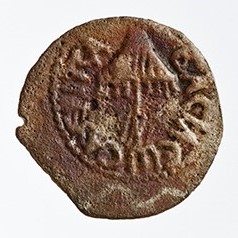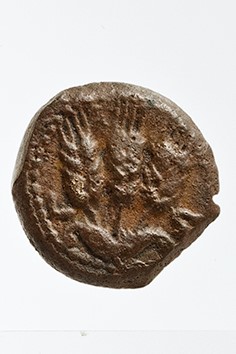Title: Copper perutah of Herod Agrippa I - 1986.06
Acquisition number: 1986.06
Author or editor: Beryl Rawson
Culture or period: Roman Imperial
Date: AD 42-43
Material: Metal - Copper
Object type: Coins - Roman
Dimensions: 18mm (w)
Origin region or location: Israel
Origin city: Jerusalem or Caesarea
Display case or on loan: 5
Keywords: Coin, perutah, Roman, Imperial, Herod Agrippa I, Jerusalem, Caesarea, Roman Judaea
See Burnett, A., Roman Provincial Coinage (London, British Museum Press, 1992) I, Judaean Kingdom, 4981; Meshorer, Y., Ancient Jewish Coinage 2 vols (Amsterdam: Amphora Books, 1982) no. 88.
See also Kokkinos, N., The Herodian Dynasty: Origins, Role in Society and Eclipse (Sheffield: Sheffield Academic Press, 1998) and Schwartz, D., Agrippa I: The Last King of Judaea (Tübingen 1990).
1986.06
Copper perutah of Herod Agrippa I
2.95 g. AD 42-43.
Minted Jerusalem or Caesarea
Obv.: Canopy. Round edge, BΑΣΙΛΕΩΣ ΑΓΡΙΠΠΑ.
Rev.: Three ears of grain issuing from between two leaves. In field, the date LS (year 6).
Agrippa I was a client king of Rome in Judaea. He was the grandson of King Herod the Great, whose territories had been divided up by Rome after Herod’s death in 4 BC. Agrippa (born in 10 BC) was brought up at Rome from childhood, in keeping with the Roman policy of educating sons of foreign rulers at Rome to ensure their socialisation as Romans and loyal allies. They were in effect hostages but were presented as honoured guests. This policy was further developed by Augustus, who had such boys brought up with members of his own household. Agrippa was one of those brought up in the house of Antonia the Younger (daughter of Augustus’ sister Octavia and Mark Antony: see 1976.16). He formed a close friendship with Antonia's son Claudius (who was the same age) and with her grandson Gaius, who was also brought up in Antonia’s house. When Gaius became emperor in AD 37 he gave Judaean territories to Agrippa, and Claudius confirmed him as king of Judaea (essentially all the former territories of Herod the Great). After the death of Agrippa in AD 44, the rule of Judaea reverted to Roman procurators.
The canopy is a symbol of monarchy, familiar in Jewish regions. Other coins of this reign bear the head of Agrippa himself or that of the emperor Claudius.
See Burnett, A., Roman Provincial Coinage (London, British Museum Press, 1992) I, Judaean Kingdom, 4981; Meshorer, Y., Ancient Jewish Coinage 2 vols (Amsterdam: Amphora Books, 1982) no. 88.
See also Kokkinos, N., The Herodian Dynasty: Origins, Role in Society and Eclipse (Sheffield: Sheffield Academic Press, 1998) and Schwartz, D., Agrippa I: The Last King of Judaea (Tübingen 1990).

